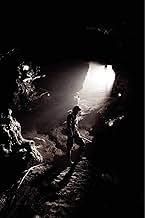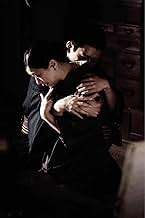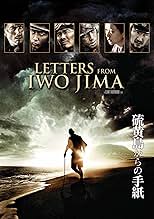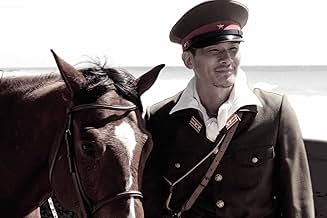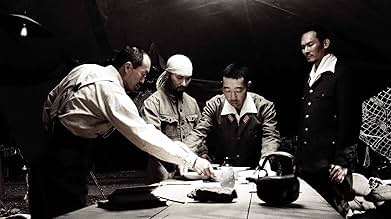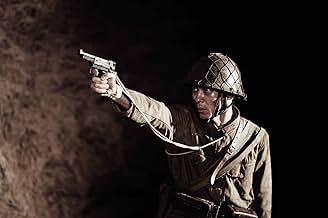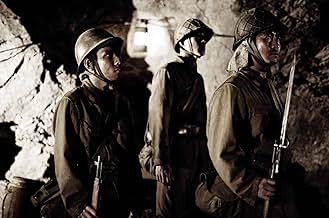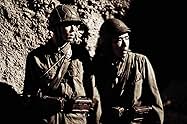La historia de la batalla de Iwo Jima entre los Estados Unidos y el Japón imperial durante la Segunda Guerra Mundial, contada desde la perspectiva de los japoneses que lucharon en ella.La historia de la batalla de Iwo Jima entre los Estados Unidos y el Japón imperial durante la Segunda Guerra Mundial, contada desde la perspectiva de los japoneses que lucharon en ella.La historia de la batalla de Iwo Jima entre los Estados Unidos y el Japón imperial durante la Segunda Guerra Mundial, contada desde la perspectiva de los japoneses que lucharon en ella.
- Dirección
- Guionistas
- Elenco
- Ganó 1 premio Óscar
- 25 premios ganados y 39 nominaciones en total
Shidô Nakamura
- Lieutenant Itô
- (as Shidou Nakamura)
Luke Eberl
- Sam
- (as Lucas Elliot)
Sonny Saito
- Medic Endô
- (as Sonny Seiichi Saito)
Opiniones destacadas
At the conclusion of the film a person behind me said, "Incredible," twice. Another person followed with, "A masterpiece." I would concur. Perhaps it isn't a perfect film but it is a movie with great impact. I find that it is a testament to the skill of Clint Eastwood as a director and Iris Yamashita as screenwriter that some of the scenes that had the greatest impact were of minor thingsa letter read out loud, the way someone saluted, a tear, a song...
There were no clear cut heroes or villains beyond "war" itself. I'm reminded of that saying, "No one wins a war. One side simply loses more than the other." War diminishes us all. We must learn to turn our backs on such endeavors even if it means that the military/industrial death merchants take a cut in profits or that they truly learn to hammer swords into plow shares.
If the film were to depict the battle in a manner that was realistically experienced by the soldiers the film would be unbearable to any viewer. One must see the battle and history as a kind of allegorical backdrop to a story about the utter inhumanity and futility of war. As a film it had to illustrate the overall societal insanity of war through a human lens, and it did this in a deeply moving way.
There were no clear cut heroes or villains beyond "war" itself. I'm reminded of that saying, "No one wins a war. One side simply loses more than the other." War diminishes us all. We must learn to turn our backs on such endeavors even if it means that the military/industrial death merchants take a cut in profits or that they truly learn to hammer swords into plow shares.
If the film were to depict the battle in a manner that was realistically experienced by the soldiers the film would be unbearable to any viewer. One must see the battle and history as a kind of allegorical backdrop to a story about the utter inhumanity and futility of war. As a film it had to illustrate the overall societal insanity of war through a human lens, and it did this in a deeply moving way.
10max-745
I have watched this film twice already this week (first week of release here in Japan). I am an American living in Japan for the past twenty two years and have yet to see such a strong performance from an (almost) all-Japanese cast. This movie draws you into the caves and makes you a part of the Japanese soldier's life. The main characters all have an interesting story to tell. But in the end the message is clear. War is futile.
The strangest part of all. Clint Eastwood has made a Japanese movie that the Japanese should have made. There is almost no way to tell it was a "foriegn" production until you see the credits.
The strangest part of all. Clint Eastwood has made a Japanese movie that the Japanese should have made. There is almost no way to tell it was a "foriegn" production until you see the credits.
The film concerns about General Kuribayashi(Ken Watanabe)who takes command of the troops on the island of Iwo Jima, he's responsible for the defense of the island from the US army , one of the most difficult campaigns of the Pacific theater. While a young soldier named Saigo(Ninomiya) faces the war horror. When the battle starts , both Kuribayashi and Saigo encounter courage, bravery, and honor.The picture is magnificently directed by Clint Eastwood(Flag of our fathers), and his son Kyle Eastwood realized an atmospheric musical score. Appropriate and colorful cinematography by Tom Stern. Spectacular production design by Henry Bumstead in his last film , he usually worked for Alfred Hitchcock and Clint Eastwood. Splendid screenplay by Paul Haggis(also producer along with Steven Spielberg). Rating : Above average, well worth watching.
Adding more details over the largely described on the movie, the events happened of the following manner: Iwo Jima is a tiny island of volcanic rock and black sand. It has no natural water supply and covers just 8 square miles. Its capture was vital to the US war effort , however. It was one of the inner ring of islands protecting mainland Japan. It also lay almost halfway between the Japanese home island and the Marianas which had been occupied by US forces in mid-1944. The island was defended by 21.000 Japanese. The commander , Major General Kuribayashi had worked hard to add to the natural defenses , especially around Mount Suribachi and in the North. He had built one of the most formidable defensive complexes of the war. It had miles of tunnels and trenches , hundred of underground emplacements, antitank ditches and mini-fields. Kuribayashi knew that the garrison had no hope of any outside help and could not withdraw from the island. He ordered his men to fight and die in their trenches. They should kill as many enemy as possible, using the network of tunnels to get destruction squads, joining a squad meant almost certain death. Kuribayashi chose not to oppose the initial landings on the beaches. He would lure the US troops inland into the web of defensive positions in the interior. The US invasion was code-named operation detachment. When US bombers began attacking was bombed every day in what was the longest and heaviest aerial bombardment of the whole Pacific war. The landings involved 800 warships, manned by a total of 220.000 crew. About 110.000 troops were to take part in the initial assault of follow-on landings. The landings themselves were responsibility of three Marine Divisions under the command of Major General Harry Schmidt. US Marines took cover from Japanese fire on a beach of volcanic sand, March 5,1945 and Mount Suribachi rises behind them. The island was declared secure on March 26, the 36 days of fighting had taken a terrible toll on both sides. Some 5.931 Marines had been killed and 17.372 wounded. There were also about 2.800 naval casualties. The precise number of Japanese dead is not known. Only 216 men surrendered during the fighting, although another 900 or so surrendered later. The rest of the 21.000 troops died. The intensity of the fighting for Iwo Jima worried US commanders and politicians. The Japanese had been willing to die almost to a man to protect a tiny part of their homeland. They had inflicted severe losses on the US forces.
Adding more details over the largely described on the movie, the events happened of the following manner: Iwo Jima is a tiny island of volcanic rock and black sand. It has no natural water supply and covers just 8 square miles. Its capture was vital to the US war effort , however. It was one of the inner ring of islands protecting mainland Japan. It also lay almost halfway between the Japanese home island and the Marianas which had been occupied by US forces in mid-1944. The island was defended by 21.000 Japanese. The commander , Major General Kuribayashi had worked hard to add to the natural defenses , especially around Mount Suribachi and in the North. He had built one of the most formidable defensive complexes of the war. It had miles of tunnels and trenches , hundred of underground emplacements, antitank ditches and mini-fields. Kuribayashi knew that the garrison had no hope of any outside help and could not withdraw from the island. He ordered his men to fight and die in their trenches. They should kill as many enemy as possible, using the network of tunnels to get destruction squads, joining a squad meant almost certain death. Kuribayashi chose not to oppose the initial landings on the beaches. He would lure the US troops inland into the web of defensive positions in the interior. The US invasion was code-named operation detachment. When US bombers began attacking was bombed every day in what was the longest and heaviest aerial bombardment of the whole Pacific war. The landings involved 800 warships, manned by a total of 220.000 crew. About 110.000 troops were to take part in the initial assault of follow-on landings. The landings themselves were responsibility of three Marine Divisions under the command of Major General Harry Schmidt. US Marines took cover from Japanese fire on a beach of volcanic sand, March 5,1945 and Mount Suribachi rises behind them. The island was declared secure on March 26, the 36 days of fighting had taken a terrible toll on both sides. Some 5.931 Marines had been killed and 17.372 wounded. There were also about 2.800 naval casualties. The precise number of Japanese dead is not known. Only 216 men surrendered during the fighting, although another 900 or so surrendered later. The rest of the 21.000 troops died. The intensity of the fighting for Iwo Jima worried US commanders and politicians. The Japanese had been willing to die almost to a man to protect a tiny part of their homeland. They had inflicted severe losses on the US forces.
10sford-20
I was very disappointed to learn that this movie was only going to have a limited showing in the US, only one or two theaters on either coast. My wife and I both enjoyed "Flags" and were pleased when we learned that Clint Eastwood made a second movie, this time telling the story from the Japanese perspective. As luck would have it, we going to Japan for the holidays so we decided to try and see the movie in Tokyo during our trip. We went to the Ginza area of Tokyo and, to our surprise, the movie was completely sold out. We needed to buy tickets at least one day in advance. Further, we learned that the movie was currently number 1 in Japan. Wow that's impressive that an American made movie would become number one in Japan! Way to go, Clint! After a little extra planning and some adjustments to our schedule, we bought advance tickets and came back the next day.
We completely loved it. We were moved and stirred with many emotions including anger, anger over the horrors of war. We actually liked it better than "Flags of our Fathers". The movie was in Japanese and, as near as we could tell, Japanese appears to be the native language of the film. There were brief moments of English, American solders talking, one flash back scene before the war during a foreign dignitary dinner, and of course the credits at the end. The movie would have to be translated and/or sub titled to English in order to have half a chance in the US. Frankly, I think translation would take away from the movie's beauty and meaning. I understand a limited amount of Japanese so I could follow most of the story. The theater was very big and packed. I was a little uncomfortable at first; I may well have been the only American in the place. My wife (who is Japanese) and I sat next to an older couple. At several points during the film, I thought I noticed the man from the couple crying. When the film ended, my wife talked with the couple and learned that the old man's father died in Iwo jima. Later during the trip, speaking with Japanese friends and seeing the Japanese news, stories of lost loved ones from the war were common and this movie for the Japanese people has brought many of these memories out in the open.
To the Japanese, Iwo jima was a part of their homeland where a foreign invader was going to land and begin its invasion on Japanese soil. Throughout all of recorded Japanese history, never had a foreign invader prevailed in war against the Japanese on Japanese land. The imperial Japanese government of that time used this when they sent fighters to Iwo jima. These fighters were to ordered to "fight to the death" defending their country. That to loose and not die fighting would bring disgrace to self and family. They knew that America was planning to send an overwhelming force and they knew that they were being sent to die. For Americans, Iwo jima was just another far away place and different point in time where American boys were sent and where, unfortunately, some lives were lost fighting for freedom. My god, have we become that blasé about the wars our sons and daughters are being sent to fight in? My wife and I are unique, not typical American movie goers. I'm American, my wife is Japanese. Together, we've visited and cried together at the A-bomb Dome in Hiroshima, and again at the Arizona Memorial in Hawaii. I have relatives who fought in the Pacific, she also has family who fought in the war and who lived in Hroshima. I have two sons now serving in the US Marines. Together my wife and I watched and enjoyed both movies. The movies really didn't bring anything new, historically, to us about Iwo jima. But, the movies did do an excellent job reminding us that the ones who pay the price for war are normal everyday people. People who really don't understand the reasons or the politics behind why they are being sent to die. People who live, love, and are loved by family and friends. People with dreams and ambitions. But, for some reason when called by the leaders of the time, they go forward, obey orders, and do their duty. Sometimes, paying the ultimate price.
I've grown up with Clint Eastwood and it has been a wonderful entertaining journey. These two movies are, in my opinion, his best. Not because of the action, or the drama, or any of the other things that Clint Eastwood is known for, but because he's given us two interlinked stories about the affects of war on the people who are called to pay the ultimate price people like you and me. We may be from different cultures, eat different food, speak different languages, prey to God differently, but we all have things in common. We all live, love, want to be loved, and we dream about and long for peace. And, sometimes we are called to serve and pay for the opportunity. Thank you Clint.
We completely loved it. We were moved and stirred with many emotions including anger, anger over the horrors of war. We actually liked it better than "Flags of our Fathers". The movie was in Japanese and, as near as we could tell, Japanese appears to be the native language of the film. There were brief moments of English, American solders talking, one flash back scene before the war during a foreign dignitary dinner, and of course the credits at the end. The movie would have to be translated and/or sub titled to English in order to have half a chance in the US. Frankly, I think translation would take away from the movie's beauty and meaning. I understand a limited amount of Japanese so I could follow most of the story. The theater was very big and packed. I was a little uncomfortable at first; I may well have been the only American in the place. My wife (who is Japanese) and I sat next to an older couple. At several points during the film, I thought I noticed the man from the couple crying. When the film ended, my wife talked with the couple and learned that the old man's father died in Iwo jima. Later during the trip, speaking with Japanese friends and seeing the Japanese news, stories of lost loved ones from the war were common and this movie for the Japanese people has brought many of these memories out in the open.
To the Japanese, Iwo jima was a part of their homeland where a foreign invader was going to land and begin its invasion on Japanese soil. Throughout all of recorded Japanese history, never had a foreign invader prevailed in war against the Japanese on Japanese land. The imperial Japanese government of that time used this when they sent fighters to Iwo jima. These fighters were to ordered to "fight to the death" defending their country. That to loose and not die fighting would bring disgrace to self and family. They knew that America was planning to send an overwhelming force and they knew that they were being sent to die. For Americans, Iwo jima was just another far away place and different point in time where American boys were sent and where, unfortunately, some lives were lost fighting for freedom. My god, have we become that blasé about the wars our sons and daughters are being sent to fight in? My wife and I are unique, not typical American movie goers. I'm American, my wife is Japanese. Together, we've visited and cried together at the A-bomb Dome in Hiroshima, and again at the Arizona Memorial in Hawaii. I have relatives who fought in the Pacific, she also has family who fought in the war and who lived in Hroshima. I have two sons now serving in the US Marines. Together my wife and I watched and enjoyed both movies. The movies really didn't bring anything new, historically, to us about Iwo jima. But, the movies did do an excellent job reminding us that the ones who pay the price for war are normal everyday people. People who really don't understand the reasons or the politics behind why they are being sent to die. People who live, love, and are loved by family and friends. People with dreams and ambitions. But, for some reason when called by the leaders of the time, they go forward, obey orders, and do their duty. Sometimes, paying the ultimate price.
I've grown up with Clint Eastwood and it has been a wonderful entertaining journey. These two movies are, in my opinion, his best. Not because of the action, or the drama, or any of the other things that Clint Eastwood is known for, but because he's given us two interlinked stories about the affects of war on the people who are called to pay the ultimate price people like you and me. We may be from different cultures, eat different food, speak different languages, prey to God differently, but we all have things in common. We all live, love, want to be loved, and we dream about and long for peace. And, sometimes we are called to serve and pay for the opportunity. Thank you Clint.
Don't listen to the people who call this movie inaccurate or revisionist history.
The movie is accurate. There were people on both sides of the war who at times showed kindness.
Labeling all the Japanese soldiers as people who tortured POWS would be like saying all American soldiers in Vietnam killed and rape innocent Vietnamese. Or all American soldiers in Cuba tortured POWS from the wars in the Middle East. You can't group people together like that.
This movie shows better than any other film that there's really no good guys or bad guys when it comes to war. War is just pointless.
The movie is not supposed to be a documentary so the people who bash it for little details should go rent a documentary if thats what they want to see.
Also, Clint Eastwood deserves major credit for telling both sides of the war. Too many war movies always show the enemy as "heartless monsters" when it reality its never like that.
This is without a doubt the best movie of the year. Make sure you go see it.
The movie is accurate. There were people on both sides of the war who at times showed kindness.
Labeling all the Japanese soldiers as people who tortured POWS would be like saying all American soldiers in Vietnam killed and rape innocent Vietnamese. Or all American soldiers in Cuba tortured POWS from the wars in the Middle East. You can't group people together like that.
This movie shows better than any other film that there's really no good guys or bad guys when it comes to war. War is just pointless.
The movie is not supposed to be a documentary so the people who bash it for little details should go rent a documentary if thats what they want to see.
Also, Clint Eastwood deserves major credit for telling both sides of the war. Too many war movies always show the enemy as "heartless monsters" when it reality its never like that.
This is without a doubt the best movie of the year. Make sure you go see it.
¿Sabías que…?
- TriviaShot back-to-back with La conquista del honor (2006).
- ErroresWhen the soldiers in the cave commit suicide they use what look like type 97 hand fragmentation grenades held close to their chests.
The point of most grenades is to send out numerous fragments as fast-flying projectiles killing those close by (a few yards) or seriously injuring those further away.
However, even though the soldiers are all standing a few feet apart, as each grenade explodes only the person holding it is affected.
- Citas
General Tadamichi Kuribayashi: If our children can live safely for one more day it would be worth the one more day that we defend this island.
- Bandas sonorasString Quartet No.6, Op. 1-6, Hob. III-6, Mov.2
Composed by Joseph Haydn
At a party where Ken Watanabe participated
Selecciones populares
Inicia sesión para calificar y agrega a la lista de videos para obtener recomendaciones personalizadas
Detalles
- Fecha de lanzamiento
- País de origen
- Sitios oficiales
- Idiomas
- También se conoce como
- Letters from Iwo Jima
- Locaciones de filmación
- Productoras
- Ver más créditos de la compañía en IMDbPro
Taquilla
- Presupuesto
- USD 19,000,000 (estimado)
- Total en EE. UU. y Canadá
- USD 13,756,082
- Fin de semana de estreno en EE. UU. y Canadá
- USD 89,097
- 24 dic 2006
- Total a nivel mundial
- USD 68,673,228
- Tiempo de ejecución2 horas 21 minutos
- Color
- Mezcla de sonido
- Relación de aspecto
- 2.39 : 1
Contribuir a esta página
Sugiere una edición o agrega el contenido que falta







